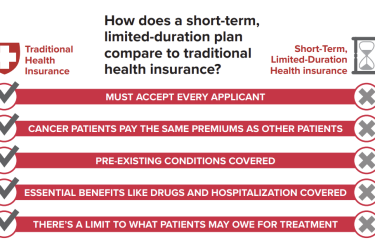 For better or for worse, health care continues to dominate the Democratic primary. If you’re having trouble understanding precisely where each candidate stands, you aren’t alone. It sometimes seems they aren’t quite sure either.
For better or for worse, health care continues to dominate the Democratic primary. If you’re having trouble understanding precisely where each candidate stands, you aren’t alone. It sometimes seems they aren’t quite sure either.
Bernie Sanders and Elizabeth Warren, of course, are the most prominent advocates of a “pure” single-payer coverage system called Medicare for All. It would ban private insurance and significantly overhaul the current system within a few years. (Warren also has an interim coverage plan before Medicare for All).
Joe Biden wants to build on the Affordable Care Act, such as adding a public option (government-financed plan) within the ACA exchange and taking other steps toward universal coverage without scrapping the current system.
Other candidates have proposed assorted options, such as Medicare for All who want it from Pete Buttigieg and Kamala Harris’ Medicare for all system variation that preserves private insurance Medicare Advantage option.
Most candidates outline their positions on their website (with varying degrees of detail. Andrew Yang, for instance, backs Medicare for All, critiques the incentives in the current fee-for-service system, and notes that incentives need to be changed, including how physicians are paid. But he also wants to keep a private insurance option. Yang hasn’t fleshed it all out, although he promises to do so shortly.
Two articles may be helpful in understanding the ideas and vocabulary behind the Democratic debate. One is a brief from the Commonwealth Fund that lays out the basic policy options that Democrats have put forth to cover more people:
- Single-payer
- Public-private hybrid
- A more significant government role in regulating private plans, such as by limiting profits or tying payments to Medicare rates.
The second is an article by UNC Chapel Hill health policy expert Prof. Jonathan Oberlander, published in the Milbank Quarterly, which explains the various approaches, defines the terminology, and explains their historical roots. As Oberlander notes, “The rise of Medicare for All has been accompanied by growing confusion over its meaning.”
Several media outlets have assembled guides and trackers. Below are some of the most helpful. (Keep in mind that some are updated more often than others, and the Democratic field and candidate positions will be shifting for some time to come.)
- The Washington Post: Where 2020 Democrats Stand on Medicare for All
- NPR: Health Care: See Where The 2020 Democratic Candidates Stand
- Politico Candidate Tracker: Medicare for All
- Reuters Factbox: Where the Top Democratic Candidates Stand on Medicare for All
- Bloomberg Graphics: Democratic Presidential Medicare Debate







